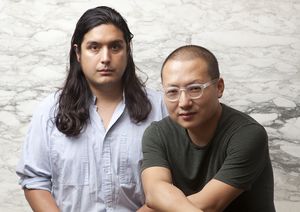Difference between revisions of "Chen Chen & Kai Williams"
| Line 10: | Line 10: | ||
Notable composites include UV bonding cut stone to glass as seen in [[Floating Stone]] tables and encasing glass spheres in zinc for [[Brittle Star]] lights. | Notable composites include UV bonding cut stone to glass as seen in [[Floating Stone]] tables and encasing glass spheres in zinc for [[Brittle Star]] lights. | ||
==Environments== | ==Environments== | ||
| Line 28: | Line 19: | ||
[[Études Pop-Up]] | [[Études Pop-Up]] | ||
== | ==Manufacturing== | ||
When the studio began all products were handmade in the [[Studio Produced|studio]] and a large majority of designs, especially ones with unconventional materials and processes, are still made in the studio. Starting in 2014 the studio began working with [[Self Sourced|factories and fabricators]] in the United States and overseas to make less complex, single material products. The studio also works with [[Manufacturing Partners|manufacturing partners]] to create a wide range of designs for various markets. | |||
==Anecdotes== | ==Anecdotes== | ||
The decision to put Chen's name first was to reference the CK of Calvin Klein. | The decision to put Chen's name first was to reference the CK of Calvin Klein. | ||
Revision as of 13:49, 26 June 2018
Chen Chen & Kai Williams is a design studio that explores materials and new ways to use them. The studio invents new techniques and materials or diverts common industrial supplies to off-label applications.
Chen Chen and Kai Williams met while attending the Pratt Institute and founded the company in New York City in 2011 at 13 Greenpoint Avenue. The studio creates a wide range of products from one-off and limited production collectible works to specialty commercial goods.
Past clients include Whitney Museum, Phillips de Pury, Gagosian, Kvadrat, Shinola and Mission Chinese Food. Presentations of their work have been held at the Museum of Art and Design (USA) and the Venice Architecture Biennale (Italy).
Material Exploration
The first collaborative project of Chen Chen and Kai Williams was the Cold Cuts Coasters, produced by soaking strips of spandex netting and rope into urethane resin and then wrapping it around a primarily wood core. This experimental method of playing with materials has become a signature of the studio, especially in the creation of composite materials (two or more disparate types of materials combined into one).
Notable composites include UV bonding cut stone to glass as seen in Floating Stone tables and encasing glass spheres in zinc for Brittle Star lights.
Environments
While a small part of the practice, the studio has been the designers of retail environments including a display system that is used in 3 Baggu Store locations as well as adapted for tradeshow booths. To outside viewers this system may be surprisingly minimal and is designed to disappear once the highly colorful and graphic products are placed on it.
Manufacturing
When the studio began all products were handmade in the studio and a large majority of designs, especially ones with unconventional materials and processes, are still made in the studio. Starting in 2014 the studio began working with factories and fabricators in the United States and overseas to make less complex, single material products. The studio also works with manufacturing partners to create a wide range of designs for various markets.
Anecdotes
The decision to put Chen's name first was to reference the CK of Calvin Klein.
